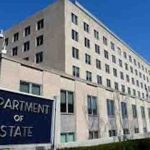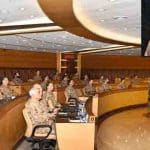ISLAMABAD, Sep 30 (APP): The UN Resident Coordinator and Humanitarian Coordinator in Pakistan, Julian Herneis, on Friday said all-out efforts were being made to tackle the post flood situation in 84 affected districts of Pakistan.
He said the international community was responding in the difficult situation and special priority was being given to food, health and shelter in affected areas.
Multiple diseases, especially malaria, diarrhoea and skin ailments, were also spreading in the flood-hit areas, he told a joint press conference here along with representatives of World Health Organization (WHO), United Nations International Children’s Emergency Fund (UNICEF), National Humanitarian Network (NHN) and United Nations High Commissioner for Refugees (UNHCR).
Julian said according to the rapid needs assessment conducted in collaboration with the government, the UN and humanitarian partners, much high number of people was in need of the life-saving support services. The results of the assessment would be shared early next week.
He said one month after the flash appeal for $ 160 million for immediate relief, “we have pledges for $160 million, with $90 million received. We are thankful for the speed of the response from the donors and look forward to future support”.
He said in view the growing needs of flood affectees, a revised appeal would be made next week in Geneva. The focus of the revised appeal would be on lifesaving support for immediate and urgent needs.
Julian appreciated the front line workers as heroes of the hour. “Lady health workers, doctors, paramedics, and other staff work day and night to help the people, even though they themselves have been affected by the floods.”
He said food was one of the main needs of the affectees, who did not not know when they would be able to renew their livelihood to be able to feed themselves and their families. Though the “food is being delivered to vulnerable families; however, it is still not enough to meet their nutrition needs,” he added.
Julian also thanked the world for its quick support. “However, even with the government and all the humanitarian organizations working to respond to the immediate needs of the flood-affected people, the extraordinary scale of this devastation means that much more is needed.”
He sought the media’s support to carry the voice of the flood-hit people to the world so that help could be provided to them and their lives could be saved. “Their survival depends on our support enabled with the help of the world.”
Dr Palitha Gunarathna , WHO’s Representative in Pakistan, said infectious diseases were on rise in the flood-hit areas while the measles campaign was underway and a number of mobile camps had been set up.
He said for pregnancy cases and malaria treatment emergency camps were also set up in different districts.
Two cargo flight with medicines wroth 2 million dollars had arrived, while more would come in a short period of time, he added.
He said some 55 million people had been affected by the floods in Pakistan.
Dr Inoussa Kabore, Deputy Representative of UNICEF, said: ”We are working with our partners … NGOs (non-governmental organizations) and other organizations in Balochistan, Khyber Pakhtukhwa, Punjab and Sindh” for carrying out relief activities.
He said three million people were using unsafe drinking water, which was causing more dangerous diseases and creating an alarming health situation.
Follow the PNI Facebook page for the latest news and updates.









